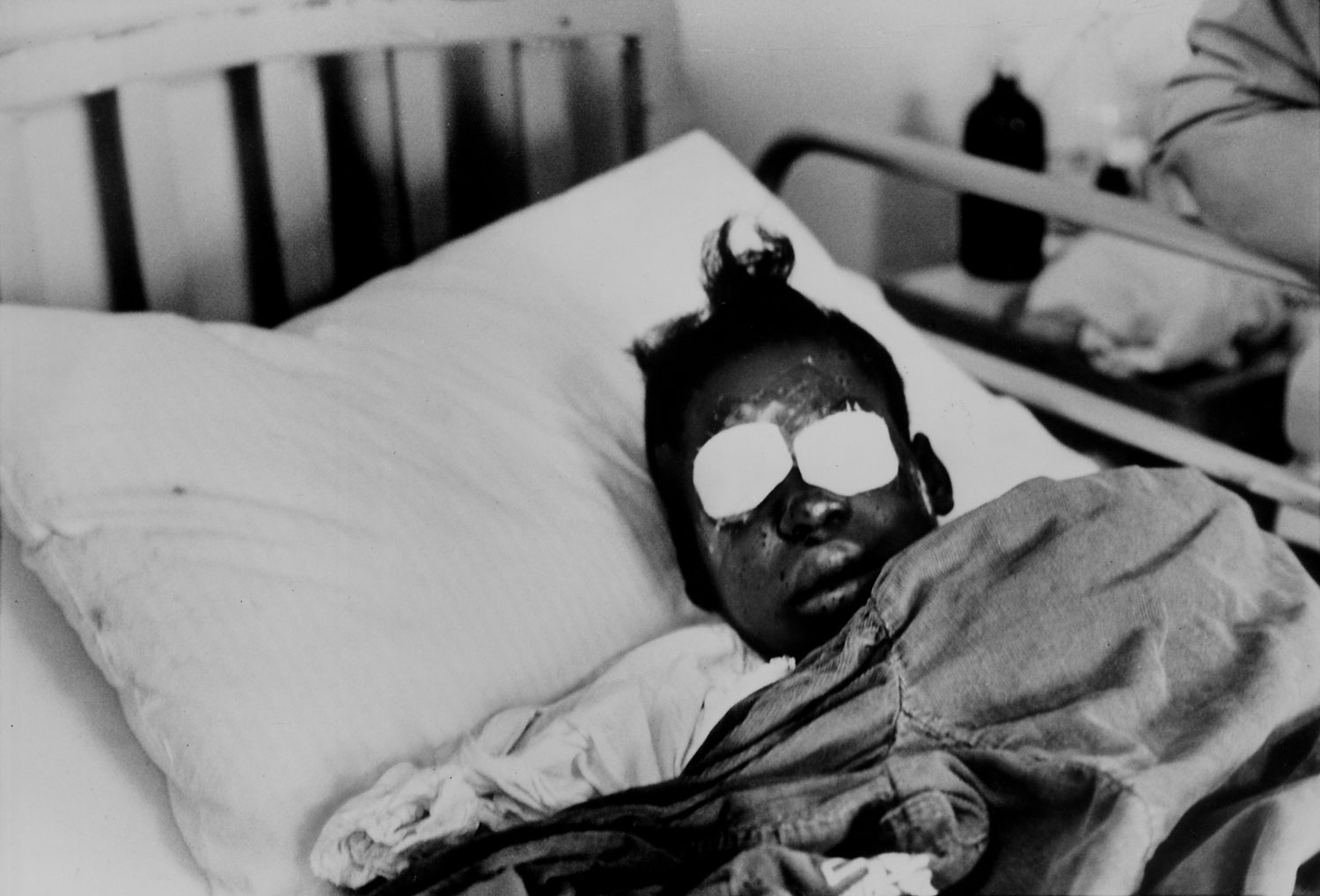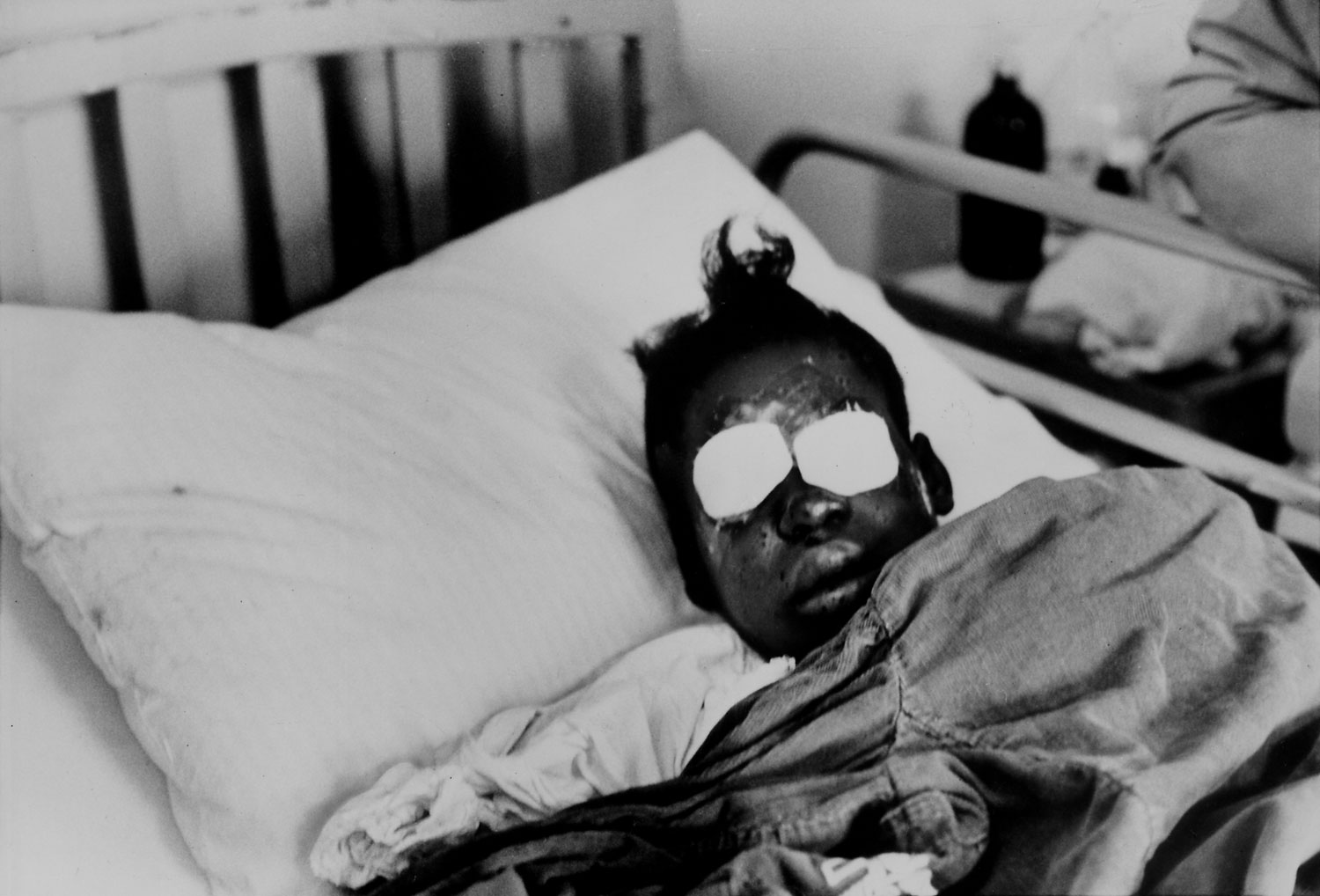
On September 15, 1963, a bomb killed four young African American girls in a church in Birmingham, Alabama. Addie Mae Collins, Carole Robertson and Cynthia Wesley were 14 years old; Denise McNair was 11. Twenty-two other people, including Addie Mae’s younger sister, Sarah, were injured in the terrorist attack, which was carried out by four members of the Ku Klux Klan. The 16th Street Baptist Church bombing, as it came to be called, was a grim turning point in the American civil rights movements, as even hardened segregationists (some of them, anyway) were appalled at the scale of violence directed at innocents.
Photographer Frank Dandridge was in Birmingham to cover the aftermath of the bombing; the funerals of the four murdered girls; and the almost inconceivably tense and volatile racial situation in the heavily armed town after the bombing. While there, Dandridge made a picture of 12-year-old Sarah Collins — bandages covering her injured eyes, cuts marking the spots where glass shards had torn her face — that became one of the signature photographs of the era: a portrait that captured, in one riveting frame, the bilious, lethal aggression that lay behind so much of the anti-integrationist rhetoric of the Deep South.
When LIFE magazine first ran the photograph in its Sept. 27, 1963, issue (see below), the editors not only called out the officially sanctioned atmosphere in Alabama that fostered such depravity, but also included what they called “a powerful condemnation from an unexpected source — a white Birmingham lawyer named Charles Morgan Jr.” Standing before a segregated meeting of the city’s Young Men’s Business Club, Morgan said of the bombing:
Who did it? It’s really rather simple. The “who” is every little individual who talks about the “niggers” and spreads the seeds of his hate to his neighbor and his son. The “who” is every governor who ever shouted for lawlessness and became a law violator. It is every senator and every representative who in the halls of Congress stands and with mock humility tells the world that things back home aren’t really like they are. It is courts that move ever so slowly and newspapers that timorously defend the law. It is all the Christians and all their ministers who spoke too late in anguished cries against violence. It is the coward in each of us who clucks admonitions. We are 10 years of lawless preachments, 10 years of criticism of law, of courts, of our fellow man; a decade of telling schoolchildren the opposite of what the civic books say. We are a mass of intolerance and bigotry and stand indicted before our young. We are cursed by the failure of each of us to accept responsibility, by our defense of an already dead institution.
Who is really guilty? Each of us. Each citizen who has not consciously attempted to bring about peaceful compliance with the decisions of the Supreme Court; each citizen who has ever said, “They ought to kill that ‘nigger.'” Every person in this community who has in any way contributed to the popularity of hatred is at least as guilty, or more so, as the demented fool who threw that bomb.
Sarah Collins (now Sarah Collins Rudolph) survived her injuries — but she lost one eye and today lives with pieces of glass embedded in the other. Now 62, she lives with her husband George not far from Birmingham, and is fighting for restitution from the federal government for medical expenses she incurred and for literally decades of suffering after the church bombing. In short, like thousands of other Americans have done (especially in recent years), she is seeking some sort of compensation as a victim of terrorism.
On September 10, 2013, Collins Rudolph attended a ceremony in Washington, where the four girls who were murdered in September 1963 were posthumously honored with a Congressional Gold Medal.
“It’s just such an awful, awful shame,” Collins Rudolph says, all these years later, “that it took that much violence for some people to finally wake up to what was happening in their own country.”

More Must-Reads from TIME
- Why Trump’s Message Worked on Latino Men
- What Trump’s Win Could Mean for Housing
- The 100 Must-Read Books of 2024
- Sleep Doctors Share the 1 Tip That’s Changed Their Lives
- Column: Let’s Bring Back Romance
- What It’s Like to Have Long COVID As a Kid
- FX’s Say Nothing Is the Must-Watch Political Thriller of 2024
- Merle Bombardieri Is Helping People Make the Baby Decision
Contact us at letters@time.com